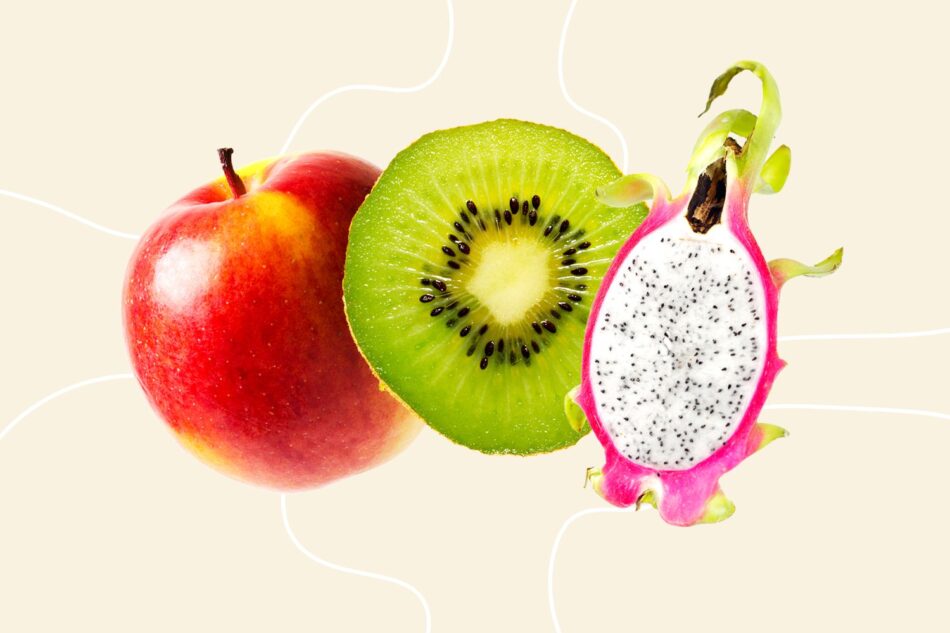- Constipation is often linked to a lack of dietary fiber and water.
- Eating more fruit every day is a simple and natural way to prevent constipation.
- Opt for whole or dried fruits such as pears, apples, dried figs and prunes.
If you struggle with occasional constipation, you may turn to prunes to get some relief, though other fruits can help too.
We all know how uncomfortable—and sometimes painful—being constipated can be. Constipation is technically defined as 3 days without a bowel movement for most people. However, this varies widely from person to person. Surprisingly (or maybe not), constipation is fairly common, especially in older adults. In fact, about 1/3 of older Americans experience constipation at least occasionally.
A lack of dietary fiber and fluids in the diet are two big culprits behind constipation. Experts suggest eating 28 to 34 grams of dietary fiber daily, yet fewer than 10% of American adults consume that much.
Other factors can contribute to constipation, too, including a lack of exercise, changes in toilet routine, avoiding the urge to poop and taking certain medications and supplements.
The good news? Research shows that eating more fiber-rich fruits can help relieve constipation. Read on to find out the best fruits—whole, dried and juice—to include in your diet to avoid constipation.
1. Pears
One medium pear contains about 5.5 g of fiber. That’s up to about 20% of your daily fiber needs in one pear.
Pears contain insoluble and soluble fiber—both of which are important for keeping your gut happy and in good working order. Insoluble fiber is found in the skin of the fruit. It does not dissolve in water and helps move stool through the gut, keeping your bowels regular. Soluble fiber is found in the flesh of the pear, and when combined with water, forms a gel that bulks up the stool.
In addition to being rich in fiber, pears are a natural laxative due to their higher fructose content and the presence of sorbitol. Sorbitol is a sugar alcohol that is not well-absorbed and draws water to the colon, making stools soft and easy to pass.
Aside from eating the whole fruit by itself, you can enjoy pears in many ways, including in our Arugula Salad with Roasted Pork Tenderloin, Pears & Blue Cheese, Baked Oatmeal with Pears, Roasted Pears with Brie & Pistachios or as a simple snack with cheese.
2. Dragon Fruit
Dragon fruit comes in two common varieties: red-skinned and yellow-skinned. Both types have white flesh with black seeds, but some red-skinned varieties also have dark red meat.
Unlike apples and pears, dragon fruits have thick, inedible skin. One cup of dragon fruit contains almost 5 g of fiber, which can provide up to 18% of your daily needs.
Enjoy dragon fruits as whole fruits cut into cubes or slices or add them into a smoothie to boost fiber intake.
3. Apples
One medium apple has about 4 g of fiber, serving up to 14% of your daily value for fiber.
Like pears, you can credit apples for their substantial amount of fiber—thanks to the skin, which contains a type of insoluble fiber, and the flesh, which contains pectin, a form of soluble fiber. Pectin is also considered a prebiotic, providing food for your gut bacteria. It may also improve bowel function and bulk up stool.
Include apples by eating the whole fruit or by including them in our simple, tasty apple recipes.
4. Citrus Fruits
Enjoying citrus fruits, like grapefruits and oranges, can help relieve constipation too. One grapefruit and one navel orange each contain about 3 g of fiber—or up to about 11% of your daily needs.
Like apples, citrus fruits have soluble fiber in the form of pectin, which helps ease constipation. Citrus fruits also have the flavonoid naringenin, which has been shown to possibly have a laxative effect.
There are many ways to eat citrus fruits as part of your meals and snacks. Eat them as is or add them to entrees like our Spicy Orange Beef & Broccoli Stir-Fry.
5. Kiwi
Kiwi fruit rounds out the list of high-fiber fruits, with one kiwi providing over 2 g of fiber—which is up to about 8% of your daily value. And if you can get past the fuzziness, you can eat the skin of the kiwi for added nutrition and fiber (just wash it first like you would any other fruit or vegetable).
Research shows that eating just two gold kiwifruits per day reduced straining, while green kiwifruits improved stool consistency.
Savor your appetite for kiwis by eating the whole fruit or by adding sliced kiwis to a salad, salsa and chips and smoothies.
Best Fruit Juices
While eating whole fruits is the best option to prevent and relieve constipation because of its fiber content, drinking juice may also help relieve constipation for some people. The sorbitol in fruit juice draws water into the intestine, which helps move contents through the gut. Prune, apple and pear juices have higher amounts of sorbitol than other fruit juices.
Prune juice might be the juice most known for its laxative effects. Research suggests prune juice can soften hard, lumpy stools in people with chronic constipation. Apple juice is another good constipation-busting beverage, according to scientists.
If you decide to drink juice as a way to resolve constipation, choose 100% fruit juice with no added sugars. And try to keep your consumption to no more than 10 fluid ounces per day.
Keep in mind that a small amount of juice consumed could go a long way, especially for children. Experts do not support offering fruit juices and juice beverages to children under 12 months and recommend that young children drink no more than 4 fluid ounces of juice per day.
For children aged 1 and older, offer small amounts and monitor your child’s bowel movements. Reduce the amount, cut the juice with water or stop offering juice when you notice any signs and symptoms of diarrhea.
If your child is older than 6 months, you can offer sips of water up to a total of 4 to 8 fluid ounces daily. Children younger than 6 months should receive only breastmilk and/or infant formula to ensure they remain hydrated for soft stools.
Best Dried Fruits
Eating dried fruits is another strategy to prevent and ease constipation. You may be better off eating certain types, though, such as dried figs and prunes.
One cup of dried figs contains about 14 g of fiber, which is quite impressive. Prunes, also known as dried plums, a common remedy for treating constipation, contain about 12 g of fiber per cup.
Both of these dried fruits are potent cures for constipation since their fiber adds bulk and weight to stools, which improves bowel frequency and consistency. Just keep in mind that dried fruits have water removed, leaving them higher in calories and sugar than fresh whole fruit—so eat them in moderation.
The Bottom Line
Eating high-fiber fruits such as apples, dragon fruit and pears is an effective home remedy to prevent and ease constipation. Some 100% fruit juices (with no added sugar) and dried fruits, such as prunes, may also promote regular bowel movements. When eating fiber-rich foods, make sure that you drink plenty of water to keep stools soft and easy to pass.









